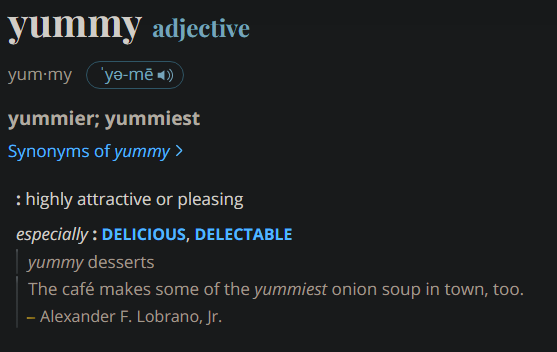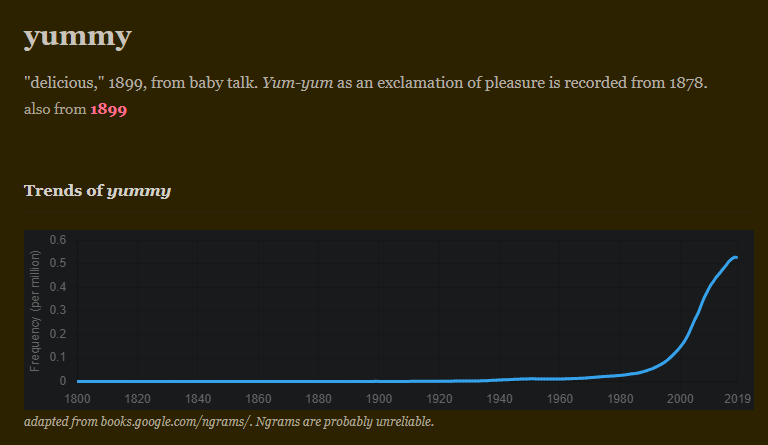created, $=dv.current().file.ctime & modified, =this.modified
tags: Word Language
related: Bites

I used the word “yummy” and was curious of the etymology.
It seems to be relate to yum-yum spoken as a display of pleasure. Yum becomes yummy.
But what interested me was the chart of usage

Clearly there was a trend toward yummy frequency (though zooming in on the late crest, we might be approaching the post-yum phase of existence.)
Of course this isn’t a direct relationship because in the past 1800s, things were yummy but they just didn’t use the word.
Yummy is a fun word to say, (yummy even) so frequency of use is kind of built-in (though this doesn’t account for the rare fun in toothsome - perhaps toothsome’s fun is more novelty based.)
But my question I posed to myself was this,
“Is the world, or at least up to the recent past, increasingly yummy?”
My immediate thought was thinking of this noosphere of yum, futuristic version of the earth where due to accelerated apex yummification we are simply constantly exposed to yum. We eat our nanobot-infused chairs which taste like the best strawberries we’ve ever had etc. etc. There is no sense of anti-yum in this future domain.
NOTE
Would us rebels even reject this and seek out rare earth rocks dug out in mines which tasted of nothing just to embrace that anti-yum, a lack of delish? Constantly tasting of sweets, we bite our lips to draw blood. Fly to distant regions of space to inhale vacuum amongst the nebulae.
Fed grey pap that is a dominant, calculated yum or a complete abandonment of yum as being derived from an intrinsic trait of the foodstuffs, like those miracleberries that alter sours to sweet allowing calorieless pickles to be eaten like popsicles, only all food is now tasting of nothing, you simply strap on the yummy apparatus which taps here and there on your brain, emits some gas and your nutritious tasteless tablet is suddenly orgasmic virtual cheese.
But on a more grounded and practical level, has our recent yum intensified?
I do think this could be the case, if only for the lighter version of the above Utopian taste. Yummy definitely corresponds with “especially deliciousness” and what is popularly delicious but excess, be it excess fat and sugars.
We have at our fingertips Uber eats and a host of dining locations. Particularly in NY even smaller towns will have unique dishes that feel cosmopolitan, honed through all of our cultures successively reacting and reaching toward the draw of the yummy.
But I also wanted this to be not “access” to yum, but a global, total increase of yum. Sure there could be pockets of yummy (a city center, a grandmother’s home), but are we all over getting more yummy?
Historically cooking itself seems easier. Access has opened up to resources from online recipes, or even plentiful book recipes, and shops where you can purchase kitchen equipment that ideally makes cooking easier.
We’d have to assume that the flavors presented here are yummy, and not simply noise. perhaps, if there is a plateau of taste occurring it can be found here? in this vague experimental field of possible meals and infinite variation. But also how are we to increase yum, here presuming this should even be a goal and not merely spreading subsistence. Maybe experimenting, like a grandmother’s iterative generational model for a maximum yummy sauce, seen like a pillar or node of taste that humanity discovers. But here perhaps we must cease variation and experimentation, distribute this yum to establish a ground floor of taste to all, and then have this new group of tasters, granted access to this taste, cultivate their own recipes for experimentation.
Yummy is by nature an extravagance, and perhaps simply providing food to all could be an aim counter to max yummy. In The Flexible Lyric Essays by Ellen Bryant Voigt a concept is brought up of the noun as the strongest part of speech. Without nouns there is no poem. I am thinking of this here, with the relationship of simply having food (the noun), to max flavor or flavor at all (this adjectival sauce that is applied.)
Me, as a human man, can start off not knowing how to cook anything. I am an infant and am fed. As a college student I’ll eat a ketchup sandwich. But with time and practice, I’ll develop skills and understand how to prepare a meal. I’ll taste things that inspire and work towards recreating that, and sharing it with others who I prepare my meals for. So, on the individual level there is a net gain of yummy, I would say, in an individual lifetime viewed as a whole.
But also as you live, your tastes change. You lose probably would lose your appetite as an someone quite old. Your senses decline, and maybe thus those previous peaks of yummy. The ones you loved, who taught you to taste fully and richly, might also be gone. Perhaps a cultural practice of sliding lollipops into the mouths of the deceased to offset this? Egyptian Funerary Practice
Yucky
There’s a similarity to “Yucky” though opposites (at least I think, can you have a yummy yucky or a yucky yummy?).
Yu_y = yucky/yummy
The word yummy can be thought of as the opposite of yucky, especially in response to food. It’s based on yum, an interjection used to indicate that you think something is delicious or looks appetizing (yum is often thought of as the opposite of yuck). Like yucky, yummy can also be used in contexts other than food, such as to express that something is appealing.
These are expressive words. When I hear the word yummy, it’s almost like I am conditioned to hear it said through mouthfuls of something (there’s a bit of a mumble to yummy). Yucky also carries this trait, but less (like it is being expelled violently.) I could be priming myself but neither of these words feel neutral to me, there’s always an energy to them.